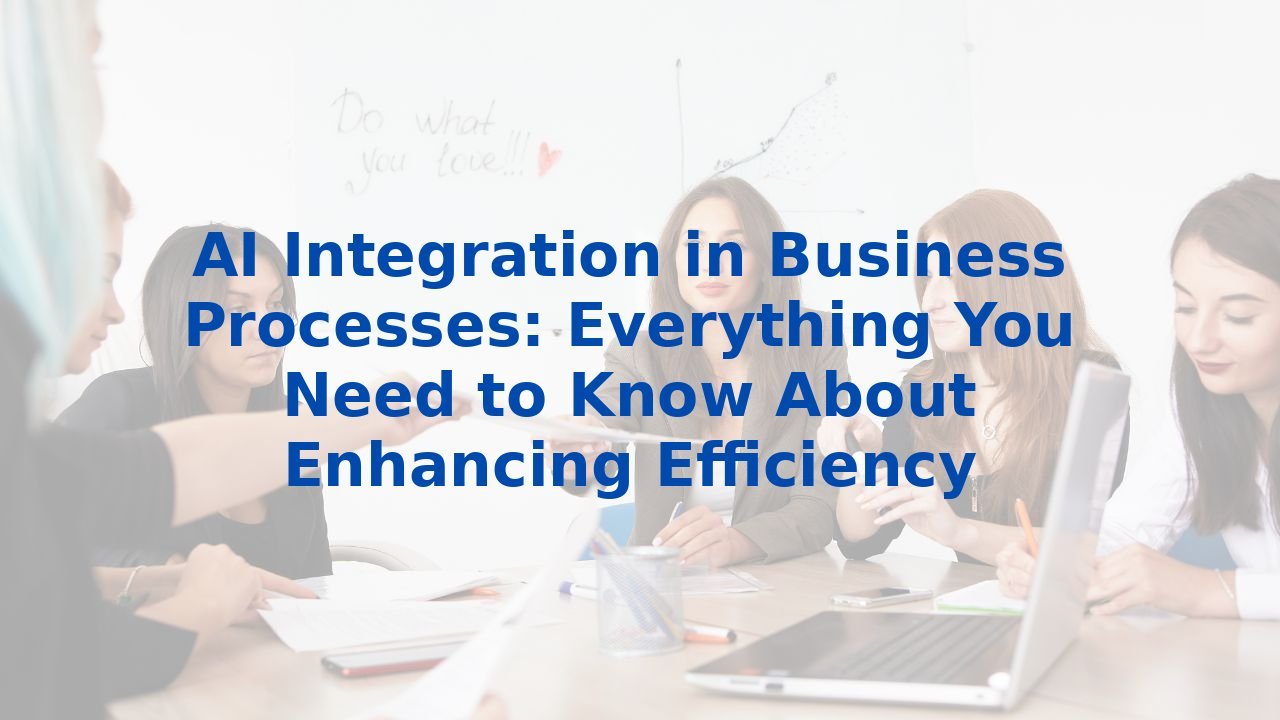AI Integration in Business Processes: Everything You Need to Know About Enhancing Efficiency
Enhancing Business Processes with AI: A Comprehensive Guide
Introduction
In today's fast-paced business environment, organizations are constantly on the lookout for innovative solutions to bolster their operational efficiency and make data-driven decisions. One of the game-changing advancements in this arena is the integration of Artificial Intelligence (AI) into business process management. This article will explore how AI enhances business processes, honing in on core components like data analysis, process construction, automation, and optimization.
The Role of AI in Business Process Management
AI significantly shapes business process management by addressing three core elements: data analysis, process building, and automation.
- Data Analysis: AI excels at sifting through massive datasets to unveil trends, predict outcomes, pinpoint root causes, and provide insights that drive effective decision-making. This capability proves invaluable across various functions, including Human Resources, where AI can consolidate data to ensure equitable compensation, or in sales, where it tailors customer journeys based on behavioral analysis.
- Process Building: AI facilitates the creation of new processes and workflows tailored to user-defined parameters. This automation accelerates the process setup, allowing teams to redirect their energy towards more strategic initiatives.
- Automation: AI is adept at automating repetitive tasks that once required manual intervention. For instance, it can manage document processing, effortlessly extract crucial information, and seamlessly integrate it into existing systems, dramatically enhancing overall productivity.
Enhancing Operational Efficiency
AI serves as a catalyst for operational efficiency by refining processes and minimizing errors.
- Process Discovery: Leveraging techniques like process mining, AI elucidates and maps existing workflows. This exploration is vital for uncovering inefficiencies and bottlenecks that may elude conventional scrutiny.
- Process Optimization: AI not only aids in analyzing and visualizing workflows but also provides the tools necessary to enhance them. By scrutinizing log data across systems, AI detects patterns, visualizes process flows, and identifies deviations from established processes.
- Real-Time Monitoring: AI empowers organizations with the means to monitor processes in real time, facilitating immediate intervention in response to emerging issues or opportunities. This proactive posture allows businesses to tackle potential obstacles before they escalate.
Benefits of AI in Business Processes
The integration of AI into business processes yields an array of advantages, including:
- Improved Decision Making: With access to comprehensive information and scenario simulations, AI enables faster, more informed decision-making, ultimately cutting down on the time spent navigating complex choices.
- Enhanced User Experience: AI has transformed user interfaces in business process management software, making it intuitively user-friendly. This evolution allows teams to design, manage, and optimize processes without requiring deep technical expertise.
- Predictive Analytics: Employing AI allows businesses to forecast outcomes and identify potential risks, leading to proactive solutions for bottlenecks. This foresight is essential for maintaining uninterrupted workflow and maximizing efficiency.
Training Employees for AI
While AI is a formidable tool, equipping employees to harness its potential is equally crucial. Consider the following points:
- Understanding AI Capabilities: Employees must comprehend how AI operates and recognize its limitations to maximize its utility effectively.
- Data Analysis Skills: Developing foundational data analysis competencies will empower employees to interpret and leverage AI-generated insights effectively. Skills in data visualization and analytics are invaluable.
- Continuous Learning: The evolution of the business landscape demands ongoing education. Employees should commit to continual learning to stay updated with the latest advancements in AI technologies and their implications for business processes.
Conclusion
In closing, AI is revolutionizing business process management by enhancing data analysis, process construction, and automation. The benefits are clear: improved decision-making, enhanced user experiences, and robust predictive analytics. Nonetheless, to truly unlock the potential of AI, a focus on employee training is paramount. By embedding AI into their operations and upskilling their workforce, organizations can foster heightened efficiency, reduce operational costs, and pave the way for sustained growth.
For organizations looking to equip their teams with AI skills, consider exploring comprehensive training options available at Complete AI Training. Investing in employee development is a strategic choice that can yield substantial long-term rewards.



